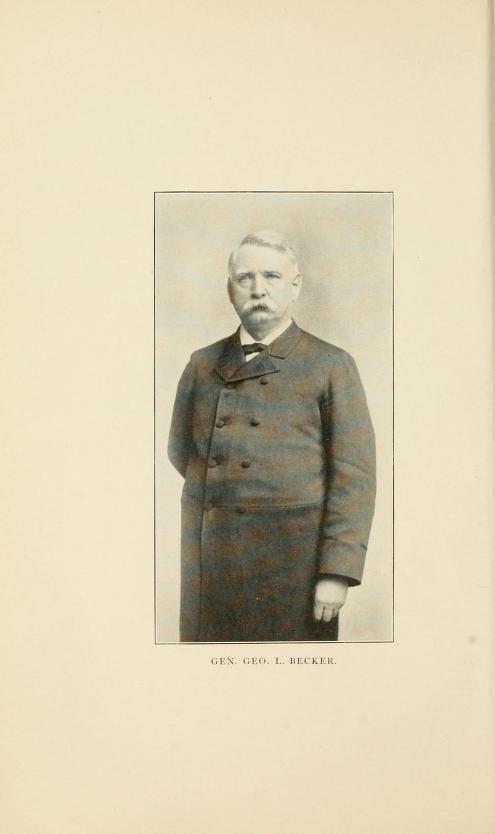Minnesota
Chapter II.
General George L. Becker.

General George L. Becker
Gen. Becker was born in Locke, Cayuga County, New York, Jan. 4, 1829. He obtained his early education in the district school of his native town, and afterwards took a course at Moravia Academy. Later he entered the preparatory department of Western Reserve College at Hudson, Ohio. In 1841 he removed with his parents to Ann Arbor, Mich., and entered the Michigan University in 1842, graduating in 1846 with the second class that went out from that institution. He arrived in St. Paul, Oct 29, 1849, and engaged in the practice of law. In 1862 he became land commisioner of the old St. Paul & Pacific Railroad, and upon the organization of the first division of that road he was made president. That was Feb 6, 1864, and he continued in that position until 1876. He bore his full share of the hard work and responsibilities attendant upon the completion of the line, and during his presidency several hundred miles of road were constructed into a country rich in resources and needing only a railroad and the settlers which would naturally follow to make it one of the richest in the Northwest. He had the pleasure of seeing the road grow from a little stub to a long line connecting the Red River with the Mississippi and St. Paul with Manitoba. During that time he filled many offices of trust and also made several business trips to the East and to Europe in the interest of the road. During his residence in this state he has beld a number of public offices. At the first municipal election in St. Paul held under the city charter he was elected president of the body, in which he served two years. In 1856 he was elected mayor of the city and in 1857 he was chosen one of the delegates to the constitutional convention, acting with the Democratic branch of that body. In October of that same year he was elected a representative in Congress to take his seat upon the admission of Minnesota into the Union. At the time of the election it was believed the state would be entitled to three representatives, but it was learned tha it was entitled to but two. He drew cuts with James M. Cavanagh and William W. Phelps, who had been elected as the other two representatives, to see who should return home. The general drew the unlucky number. He accepted the situation gracefully and returned home. He has been a lifelong Democrat, and in 1859, when he was but thirty years of age, he was unanimously nominated for governor by the Democratic convention, but was defeated by Hon. Alexander Ramsey after a hard fight. In 1860 he was a delegate to the National Democratic Convention at Charleston, S.C., which adjourned without making a nomination. After the dual nomination at Baltimore he supported the Breckenridge and Lane faction. He was elected to the state senate in 1868 and served in the tenth, eleventh, twelfth and thirteenth legislatures. In 1872 he was again nominated by his party for congress, but was defeated by the Repulicans.
When the state board of railroad and warehouse commissioners was created in 1885, Gen. Becker was appointed by Gov. Hubbard as the democratic member and was reappointed by Governor McGill, Merriam and Nelson. His thorough knowledge of railroad affairs in this state has made him an especially valuable member of the board. As a citizen he was univerally respected and admired as a man of strict integrity and unusual ability. He was the democratic candidate for governor of Minnesota in 1894. Gen. Becker died in St. Paul, on the 3rd day of January, 1904.
-- St. Paul Pioneer Press.